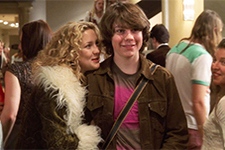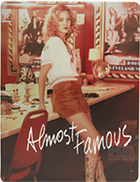Almost Famous (4K UHD)
|  It is testament to writer/director Cameron Crowe’s basic humanity as a filmmaker that he manages to turn Almost Famous, a film about sex, drugs, and rock’n’roll, into a sweet coming-of-age story that views its rising, hedonistic rock stars with the same hopeful outlook as its naïve teen protagonist. There is little doubt that this film, which is loosely based on Crowe’s own experiences as a teenage rock journalist for Rolling Stone magazine in the early 1970s, is from the same man who had previously written and directed Say Anything ... (1989) and Jerry Maguire (1996). Crowe’s on-screen alter ego is a William Miller (Patrick Fugit), a gifted 15-year-old from San Diego who manages to get an assignment from Rolling Stone to cover the latest tour of Stillwater, a fictional amalgam of The Eagles, The Who, The Allman Brothers, and Lynrd Skynrd. William’s mother, Elaine (Frances McDormand), is a loving, but overprotective, parent who has a hard time accepting her son’s decision to take a leave of absence from high school in order to write about rock stars. Having already driven William’s older sister (Zooey Deschanel) to leave the house with her strict rules and tenets against drugs, commercialism, and rock music, Elaine is in the precarious position of wanting to protect her son without driving him away, too. Before the Rolling Stone gig, William gains a mentor in Lester Bangs (Philip Seymour Hoffman), the real-life rock critic and Creem editor who helped Crowe in the early stages of his journalistic career. Although he appears in only a few scenes, Hoffman turns Lester into one of the most memorable characters in the film, a man characterized by brute honesty and a painful openness. “Don’t make friends with rock stars,” he warns William, advice that clearly derives from his own personal experience, but it is to little avail. Lester and William are connected in that they are both “uncool,” and Lester’s experience has taught him that William’s association with musicians will bathe him in a glow of acceptance he has never known before. How can William resist? Lester’s main advice is to be honest and to be unmerciful. William will eventually learn that those are the two most difficult things to be, especially when he knows that the band’s future success could very well hinge on his prose. Once on the road with Stillwater, what was supposed to be a four-day assignment turns into one lasting several weeks, as William continually tries to finish his story, always to be denied the crucial interviews he needs. Within the band there are growing tensions, notably between the talented, captivating guitarist Russell Hammond (Billy Crudup, in a role originally to be filled by Brad Pitt) and the lead singer, Jeff Bebe (Jason Lee), who feels that Russell’s popularity as an individual is casting a shadow over the band as whole. This tension is brought to a head in a perfect scene in which the band’s first official tee-shirt is revealed to have a picture of the band with Russell standing out front and the other members relegated to a hazy, out-of-focus background. During the tour, William also becomes acquainted with so-called “Band-Aids,” female groupies who consider themselves above the typical groupie because they are “there for the music.” They are true fans who, as one Band-Aid puts it, love the music so much it hurts. In the course of the tour, William falls in love with Penny Lane (Kate Hudson), a Band-Aid who has a special relationship with Russell, despite the fact that Russell is married. Penny, who keeps secret her age and real name, projects strength and security, most notably in her declarations about how she never becomes emotionally involved, therefore she can never be hurt. But, it becomes quickly clear in the way she looks at Russell that this is simply not true. She is, like everyone else, human and therefore vulnerable, which is the guiding thread in all of Crowe’s films. More than anything else, Almost Famous is about people who are constantly trying to fill the need to belong. This brings with it all kinds of tensions, especially within William, a wide-eyed teenager hanging out with rock stars who must also try to keep a critical distance. Referred to both lightly and seriously by the musicians as “the enemy,” William is in a seemingly impossible position of being simultaneously insides and outside. An outsider in his high school because of his youth, William finally finds a place where he seems to fit in, but it may all be a ruse because the musicians want him to write good things about them. Almost Famous is filled to the brim with visual details of the early ’70s, from the audacious clothing, to the musical instruments, to the beat-up tour bus. Crowe lived this life for many years, and he maintains a strict sense of time and place, which also allows him to have some fun, such as when a Rolling Stone editor talks about a mojo, some machine in which you can send pages of text over phone lines ... at the astounding speed of 18 minutes a page. There is also a great scene in which Stillwater’s new manager is trying to convince them to take advantage of the moment. “Do you think Mick Jagger is still going to be trying to be a rock star when he’s 50?” he asks (as I write this, some 21 years after the film’s theatrical release, the Stones are gearing up for a new tour, with Mick fronting at the rip old age of 78). It is readily apparent that Almost Famous is a deeply personal film for Crowe, one that took him more than a decade to bring to the screen. This gives the film a certain conviction, but like William, Crowe has some trouble keeping his critical distance. If the film has a weakness, it is in the fact that Crowe views his subject matter with a little bit too much misty-eyed nostalgia. In a way, there is an innocence to both the time and the characters. Yes, it is sex, drugs, and rock ‘n’ roll, but there is an undeniable idealism surging at the roots. And, because of this, there is never any sensation of danger. Even when Russell is strung out on acid and standing on the roof of a house, there is no real tension because the scene is played for laughs, rather than as a potentially lethal situation. Everyone seems to be having too good of a time, and the hard realities of that free-for-all lifestyle are never brought to the surface in any appreciable form. Of course, Crowe may have been trying to avoid anything that might smack of moralizing, but in the process he also avoids the harder edge that might have given the film an extra dimension of truth.
Copyright © 2021 James Kendrick Thoughts? E-mail James Kendrick All images copyright © Paramount Home Entertainment | |||||||||||||||||||||||||||||
Overall Rating: 


 (3.5)
(3.5)


